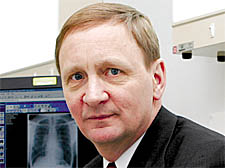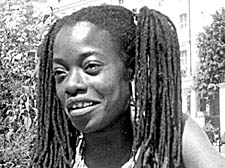|
|
 |
| |

Dr Norman Parker

Henrietta Gabriel |
Tribute from doctor who cared for brave Henrietta
Patient for 25 years at the Whittington
was a friend to all, says consultant
ONE of Britain’s top blood specialists based at the
Whittington Hospital paid a moving tribute this week to a woman
patient he had known for 25 years who became a friend.
Consultant haematologist Dr Norman Parker said Henrietta Gabriel,
41, had spent more than half her life coming to the Highgate
hospital where she was being treated for sickle-cell anaemia.
Sadly the mother of three from Islington died from complications
associated with the genetic disease, during a holiday in Kingston
Jamaica last month.
The disease was first identified more than 100 years ago and
usually afflicts people from Africa or the West Indies.
“I have never before written an obituary for a patient
but Henrietta was a friend to many, as well as being one of
the regulars” he writes in the hospital’s own current
Link magazine.
Henrietta first came in for treatment a very nervous teenager
in the 1980s. But over the years she established a marvellous
rapport with staff and became a “mother figure” to
other young sickle cell patients.
He described how as a teenager she had a fiery temper and once
even tried to hit a sister and himself over the head following
a disagreement.
He said: “Yet from those rocky beginnings we built a sense
of mutual trust and respect.”
She developed a cheerful approach to problems, he said, and
was always keen to sort out problems for other people with sickle
cell and not infrequently took on too many burdens. She regularly
lectured to medical students about the disease.
He added that 20 years ago people often died from sickle cell
in their early 20s but today with better medication and improved
lifestyles they can normally live to a ripe old age.
“I had always assumed that Henrietta would come to my retirement
party in 2014,” Dr Parker added.
He said: “I had expected to share anecdotes about the terrible
things that used to happen in the early 1980s and that I would
acknowledge her contribution to the changes that have taken
place.
“This is not to be but Henrietta would not want others
to miss out on a lesson and we need to note that sickle cell
remains an unpredictable problem and that patients can die unexpectedly
after seemingly trivial medical problems.
“Our sorrow will not be as great as that of her family,
but there are many members of staff who will sorely miss her.”
Hospital staff have made a collection which will be donated
to Henrietta’s partner and family.
There are also plans for a charity ball in July with donations
to research into the disease.
For information contact Elaine Henry on 08700 193819. |
| |
|
 |
|